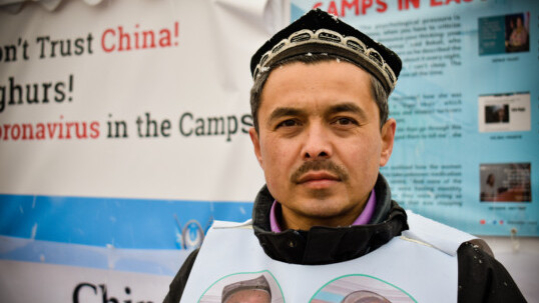Mass surveillance of the Uyghurs: STP files complaint against UBS
Angela Mattli, Campaign manager, STP, angela.mattli@gfbv.ch

Angela Mattli, Campaign manager, STP, angela.mattli@gfbv.ch
The Swiss bank UBS maintains a business relationship with the Chinese company Hikvision, the world’s largest developer and manufacturer of surveillance technologies. Hikvision plays a central role in the mass surveillance of the Uyghurs in the Chinese province of Xinjiang (East Turkestan). Although the devastating human rights situation in the region has been known for years and Hikvision has been blacklisted by the US government since Autumn 2019, research shows that UBS still maintains financial ties with the technology company. For this reason, the Society for Threatened Peoples (STP) is filing a complaint with the Swiss National Contact Point for the OECD Guidelines today.
The Chinese technology company Hikvision plays a central role in the mass surveillance of the Uyghur population in Xinjiang (East Turkestan). Research by industry experts has shown that Hikvision has installed mass surveillance systems worth close to US$ 300 million in the region on behalf of the security authorities as well as provides technology that is used in the Uyghur internment camps. According to the China Cables, published in autumn 2019, more than a million Uyghurs have been detained in these camps, while the rest of the population is tightly controlled. Despite international criticism and US sanctions, Hikvision has not distanced itself from its highly controversial operations in Xinjiang. On the contrary: according to media reports, Hikvision advertised a special camera in 2019 that recognises the ethnicity of individuals with an accuracy of 90 percent. The respective product description specifically mentioned Uyghurs as an example.
Despite human rights crisis: UBS maintains business relationship with Hikvision
According to research by the STP, UBS has maintained a business relationship with Hikvision since 2016. The bank is involved in the technology company through investment products and services as well as holds shares in the name of unknown investors as a “nominee shareholder”. Even though the human rights crisis in Xinjiang (East Turkestan) has been publicly known since mid-2018 and has been repeatedly criticized by the UN and the Swiss government, the bank still had products worth US$ 6.36 million on offer at the end of 2019. UBS has continued to invest in Hikvision through investment products since and increased its positions in February 2020. Although UBS holds a relatively small number of shares in the name of beneficiary owners, Hikvision ranked it among the ten largest shareholders for the period 2016-2019. It is also the only foreign bank to have been continuously listed in the annual reports during this period.
UBS is one of the largest foreign banks in China and highly reputed internationally. Its involvement and public naming have provided Hikvision with legitimacy, credibility and a positive climate for other investors and stakeholders.
Breach of OECD Guidelines and Code of Conduct
“In view of the central role of Hikvision in the mass surveillance of the Uyghur population in Xinjiang (East Turkestan), UBS has, in the view of the STP, failed to adequately meet its corporate social responsibility,” says Angela Mattli, STP campaign manager. Despite international criticism as well as during a meeting with the STP, UBS has not presented any convincing evidence that it performed human rights due diligence in the Hikvision case. “For this reason, the STP is of the opinion that UBS has neither complied with the OECD Guidelines for Multinational Enterprises nor with its own Code of Conduct,” says Angela Mattli. This Code requires that the Bank is “monitoring, managing and reducing any negative impact we might have on the environment and on human rights. It means managing social and environmental risks that our clients’ and our own assets are exposed to .” Further, the bank is to “live up to this Code at all times, with no exceptions.” In the view of the STP, this has not been the case in the Hikvision case. Therefore, the STP is today filing a complaint with the Swiss National Contact Point (NCP) for the OECD Guidelines for Multinational Enterprises.
The STP wants to accomplish with this complaint that UBS:
- withdraws from all financial transactions, products and services that include or relate to Hikvision;
- adapts its internal policies to ensure that its equity business, investment products and passive investments are covered by the bank’s human rights due diligence processes in the future. This also includes the incorporation of clear exit clauses in its contractual agreements so as to allow the bank to withdraw from business relationships that have an adverse impact on human rights; and
- makes transparent how it deals with business partners that are involved in human rights violations.
